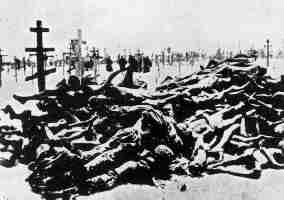
From the New Criterion.
Tim Tzouliadis’s The Forsaken tells of thousands of American socialists and Communists who moved to the Soviet Union in the thirties to find work and a workers’ paradise. They were quickly disappointed. Adam Hothschild reviews the book in the London Times (TNC subscribers can read Stephen Schwarz’s review from the September 2008 issue here):
From Alexander Solzhenitsyn and other Russians who have borne witness, we know about the midnight arrests, the interrogations and forced confessions, the trains hauling packed boxcars of emaciated prisoners to the labour camps scattered across the Arctic, Siberia, Kazakhstan and elsewhere. Tzouliadis traces the story of the Americans who got caught up in this madness through a wide range of letters and documents, and the published memoirs of two men who played on American baseball teams in Moscow in the mid-1930s, Victor Herman and Thomas Sgovio. Unlike many of their fellow players, whom they occasionally encountered in the gulag, they survived their imprisonment: Herman in central Russia and Sgovio in Kolyma. No one knows how many of the American immigrants were caught up by the Purge and perished either in execution cellars or in the camps, although one mass grave with more than 140 American bodies was found in 1997 near the Finnish border. Tzouliadis does not try to estimate the total American dead. My own guess would be that the figure is in the thousands; if we add victims among Britons and other Westerners living in USSR at the time, the total would be in the tens of thousands.
The list of useful idiots in the West is long but not very distinguished: Roger Baldwin, founder of the ACLU, Julius and Ethel Rosenberg, author and playwright, Lillian Hellman, noted author, Ernest Hemingway, and many more.
However one of the more prominent, but ironically less known, members of the “League of Useful Idiots” was correspondent, Moscow bureau chief of the New York Times, Pulitzer Prize winner, and Stalin apologist, Walter Duranty.
Duranty had a psychology which not influenced his writings but set him apart from other journalists of the day.
From the first there are certain facets of his character that differentiated him from his peers. He was imaginative and elitist, he would deliberately adopt the view of the minority on various issues, his stories would be embellished and appear more literary in form than
straight reporting. Taylor notes that he acquired initial fame with an “imagine you are there” story about the Paris Peace conference at
the end of the First World War.What makes Walter Duranty so circumspect was not only his sympathetic view of Stalin but his under reporting on the Ukrainian famine of 1932.
Breaking Eggs and Peasants
Duranty continually described Stalin as a man who “could not make an omelet without breaking a few eggs.” This was in reference to Uncle Joe’s first Five Year Plan in which Russia moved towards industrialization and agro-collectivism. While the industry rebuild was very successful the forced state ownership Soviet agriculture and peasant manned farming co-ops was a caustic reality for some in the communist state. In 1932 a famine swept across the Russian province of Ukraine in which upwards of 10 million Russians perished from starvation and malnutrition. Scholarly debate still ranges on the exact cause of the 1932 Ukrainian famine–also known as Holodomor or Hunger-Plague–but wildly held logic is the agro-economic “reforms” enacted were directly responsible. Although other theories assert that it was in direct response from the Soviet government to punish Ukraine for its growing nationalism.
Holodomor Never Happened
For six decades the Soviet Union continued to deny that the Ukrainian genocide even took place. It was not until peristokia, in the early nineties, did the Soviets finally reach full disclosure admitting the Famine actually took place and the numbers that died. Nevertheless, in the early 30’s, while the Famine was ongoing, Walter Duranty traveled the Russian countryside witnessing these atrocities first hand. Despite the realities of human suffering, Duranty continued currying Stalin’s favor by severely under reporting the carnage to the West. Thus making himself and the Times willing accomplices and complicit in the murders of millions innocent Ukrainians.
In 1933, Franklin Roosevelt officially recognized the legitimacy of Stalin’s murderous regime thanks in part to Duranty’s air-brushing of Stalin and the events which took place in Russia.
Pulitzer Controversy
Under protest by Ukrainian advocacy groups, in 2003 the New York Times reviewed Duranty’s Pulitzer Prize which he received for 13 articles he penned in 1931. Not so astoundingly, the Times and Pulitzer Prize Board lived up to their Liberal reputation. Deciding not to revoke Duranty’s Pulitzer citing that a Pulitzer is “awarded not for the author’s body of work or for the author’s character but for the specific pieces entered in the competition.”
I am sure that if Walter Duranty had outlived his usefulness to Stalin and was one of the Western useful idiots caught up in the Great Purge we would still be hearing and unending diatribe from the Times about his tireless contributions to humanity. Since that is not the case, the Times lives with the knowledge they assisted Stalin, through Duranty, in the murder of millions of innocents.
Not that it matters since you can’t make an omelet without breaking a few million eggs, even if those eggs are human beings.

